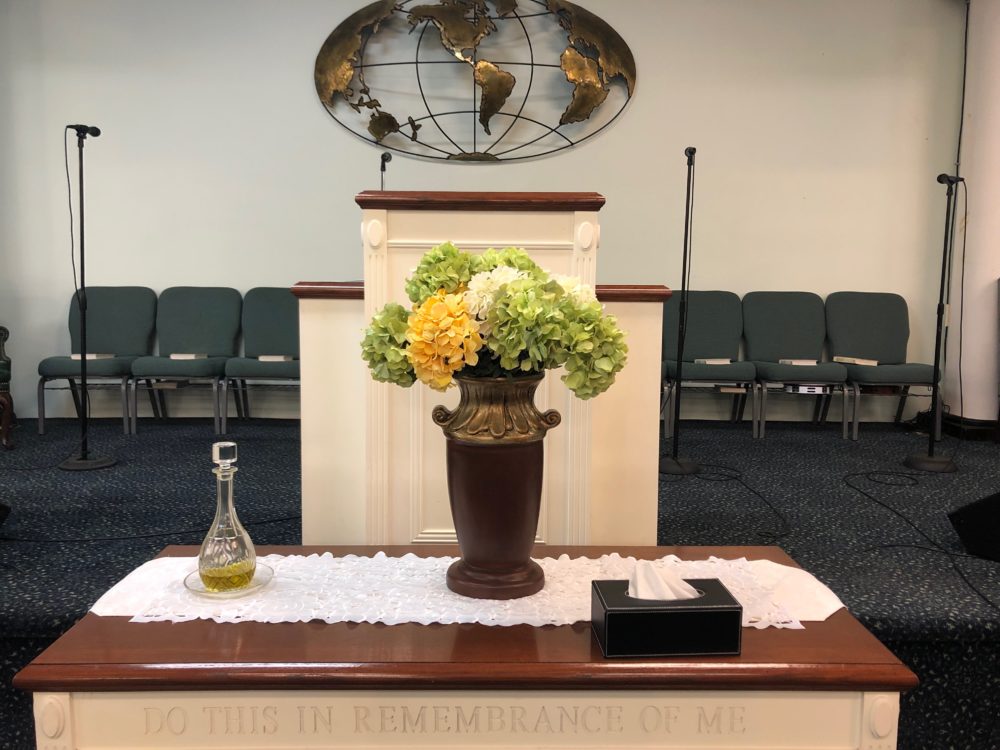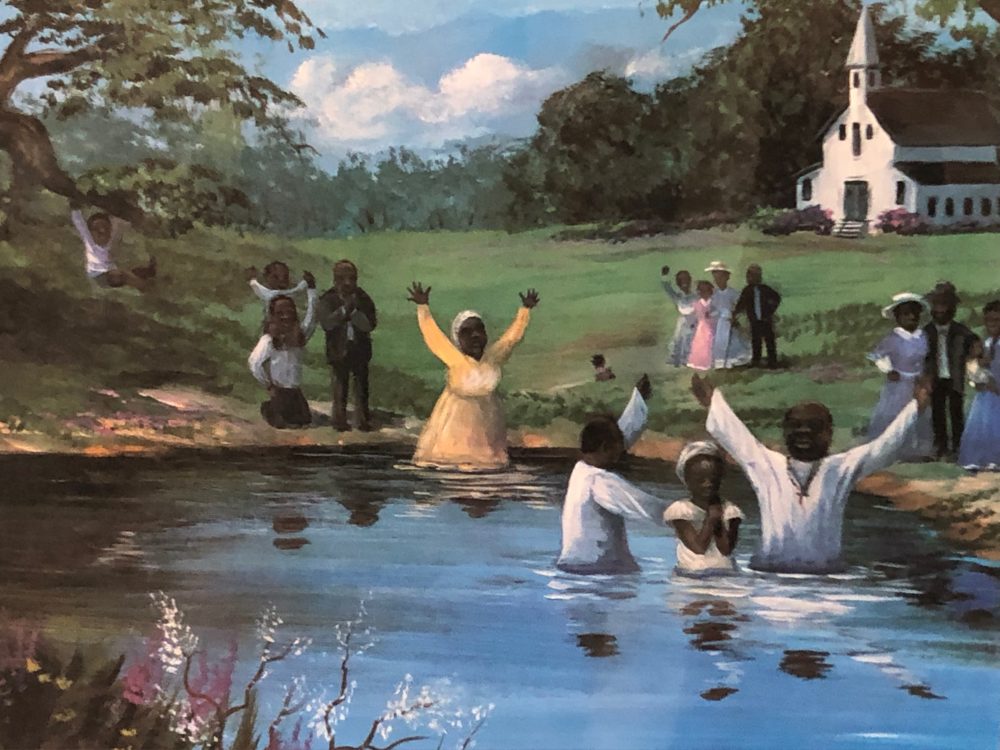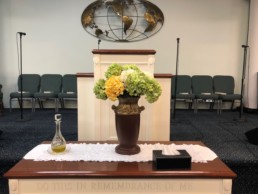The Holy Spirit
The Holy Spirit
Zoé Chevalier | zc2504@columbia.edu

The congregation slowly gathers inside the prayer hall at the United Pentecostal Church on 125th Street, between Broadway and Amsterdam. Sunday school ran a little late, but that’s ok, there are no formal hours here. The prayer service will last for about two and a half hours, but none of it will be passive: Worshippers will stand, move, dance, and sing.
Rows of chairs face a stage, where microphones and instruments—an electric piano, drums and a tambourine—signal the singing to come. No crosses, stain-glass windows or icons of saints can be seen here. Although Pentecostals believe in Christ, the traditional crucifix found in Catholic churches is replaced with a large statue representing the earth and a collection of flags from different countries. In front of the pastors console is a wide communion table, covered by a white veil. “It’s to make it look religious,” says Pastor Michael Grattan.
Patrice Martin has come all the way by bus from Philadelphia to be here today. Grattan witnessed to her 40 years ago, when she was a college student. “He saved me,” says Martin. But she feels directionless, and came to the Church to reconnect with the one who once helped her. Martin does not want to bother him, and so she sits in a corner. When the pastor comes to say hi, she introduces herself as Sister Patrice Martin. He thinks about it and says, “That’s strange. I witnessed to a Sister Patrice many years ago.” They fall into each other’s arms.
One of the singers, dressed in all white comes up to the audience, arms opened. “Let’s have a group hug,” she says. Slowly, she walks away into a corner of the room, where worshippers gather. A circle is formed. At first quiet, the circle soon comes to life. The Holy Spirit is about to arrive. Worshippers are moving their hips and raising their hands, opening their mouths wide. The rumble of their feet on the ground creates vibrations, which are growing throughout the church.
A symphony of different languages is spoken all at once: English, French, Spanish and many other languages that I do not recognize. Most of it is unintelligible, with a repetition of “Amen” and “Hallelujah,” creating a rhythm, and growing faster, louder, more passionate.
Another singer is brought into the middle of the circle. Surrounded by her peers, she bangs her chest right above her heart and moves her hands to the rhythm of her words. They are praying for her. Some are smiling, looking up at the heavens, at times letting out a powerful laugh.
Others give out painful moans, bow their heads.
Brother Philippe comes up to me and explains in French. “They are letting the Holy Spirit speak through them. They just open their mouths and let him speak.” Like many people here, Philippe was once a Catholic, but he grew tired of needing intermediaries to speak with God. Pentecostals do not believe in the Virgin Mary as the first interlocutor. “It’s like parents with their children,” explains Philippe. “You do not need to have your mother always intervene on behalf of you to your father, you have to go directly.”
Pentecostals believe in a direct approach to the Lord. No Saints, no Virgin Mary is needed as intermediary. Once a person has been “saved,” the previous “sinner” becomes a saint. All baptized members of the church are saints. They can speak directly to God, and let the Holy Spirit speak through them. They are also called to “witness” to other “sinners,” and transmit the word of the Lord.
This ritual is rooted in the day of the Pentecost, a passage in the Bible’s Book of Acts, the fifth book in the New Testament. According to Acts 2:4, the Holy Spirit descended upon Jesus’ apostles, baptizing them in the Holy Spirit, “and there appeared unto them cloven tongues like as of fire, and it sat upon each of them. And they were all filled with the Holy Ghost, and began to speak with other tongues, as the Spirit gave them utterance.” Pentecostals believe in a literal interpretation of the Bible, and see speaking in tongues as an act that can happen at any time, to anyone who has been saved.
This speaking in tongues continues throughout the service. Sometimes, as Grattan is preaching, someone will start laughing uncontrollably, someone else will speak in a different language. Once some people started making snake-like noises in the back of the room, the hissing sounds growing louder. When the Holy Spirit wants to speak, you let him in. As the service progressed, Grattan’s sermon grows more passionate:
“Don’t waste your alone time and your suffering, praise the Lord and nothing should offend you. If you can’t run, walk, and if you can’t walk, roll, but keep following God. We are the chosen people, the Second Testament says so! We are like the Jews.”
Suddenly, he stops, and the voices in the crowd go silent. One by one, some worshippers go up in front of the stage and kneel in front of the pastor, waiting to be blessed. A pregnant woman bows with difficulty. Children run up to the stage.
The adults wait patiently as Grattan slowly kneels to their level, holds their head and whispers “In the name of Jesus Christ.” Slowly they go back to their seats, calmer, blessed. Sister Patrice stayed in her seat the whole time, her eyes closed, praying. At times, she called out “Amen, Halleluyah.” A glorious smile was spread across her face.
Job and the Super Bowl
Job and the Super Bowl
Zoé Chevalier | zc2504@columbia.edu

Fewer congregants come to Bible study on Wednesdays than on Sundays at the United Pentecostal Church in Harlem. But it is no less spirited. On a recent Wednesday, seven worshippers sit in the prayer room in front of Pastor Michael Granttan. Despite his whitening hair, Grattan is an energetic man, often jumping to his feet to illustrate a lesson. He is dressed in casual clothes: A knitted sweater and pants have replaced the suit of Sunday’s service.
Grattan’s teaching style is a combination of Bible verse study, personal anecdotes, sports references and modern-day cultural applications. During the first part of the lesson, people in the audience are encouraged to ask all the questions they want, both Biblical and personal.
A young woman, whom I recognize as one of the singers of Sunday’s service, starts off by asking, “How do we know if the hardship we have been given comes from God?”
She proceeds to tell the tale of a family member who had been diagnosed with breast cancer and refused treatment, waiting for God to cure her. One day, she went to a naturopathic doctor who gave her an ointment to put on her breast. This, she said, led to an emergency mastectomy. The woman found out that during the year and a half that she had not been given treatment, the tumor had not metastasized. She praised God for protecting her. Her husband, however, blamed her for losing faith and getting the surgery, saying that God was not done curing her.
Hearing this story, Grattan stands, raises his arms and starts preaching the story of Job from the Book of Job, which is part of the Old Testament.
“Job’s animals were kidnapped!
The house fell over his children!
And then he got sick! And we know there is nothing more personal than disease. There was puss coming out of his body, it was truly horrible, but he never stopped praising the Lord.”
Grattan then uses one of his favorite sports allegories to illustrate his message: “Job was hit so hard, like in a boxing ring, poom the boxer, he got a hit with a right fist then a left fist, then he got a full-body blow!” Mimicking the scene he throws his fists in the air, punching an invisible Job.
Soon, he sits back down, saying, “We know that God gave him those hardships, but generally speaking, there are no parameters that define whether or not a hardship comes from God, we create a lot of our own problems, but we need to continue to praise God no matter what.”
He adds that he believes in going to the doctor, because “God can cure you anywhere, on the operating table as well as in your kitchen, so let him cure you though your doctor.” With a deep sigh, he concludes: “I understand, as you know sister Grattan died recently.” The crowd goes silent. Everyone knows about the recent death of the pastor’s wife to cancer.
During the second half of the session, Grattan doesn’t shy away from getting into contemporary pop-culture discussions. He comments on the Superbowl half-time show, featuring Shakira and Jenifer Lopez, saying, “I don’t understand all the fuss about the fact that it was not family-friendly.” When someone brings up that Jennifer Lopez might have been mocking the sign of cross, he defends her. “No! She was simply pole dancing!”
Grattan often tries to tone down more conservative branches of the church. “I believe in balance. God is not stupid, only human beings are. Be careful about turning principles into law.” When someone in the church asks if women are allowed to wear pants, he says of course. “And what about swimsuits?” asks a man. “Is it true we are not allowed to go to the beach or swimming pool even on a hot day?” Another woman laughs. “I go to the beach!” she says. Grattan ends the discussion saying, “Yes you can. I also believe that there are apostolic swimsuits that are more modest.”
At the end of the study session, Grattan gets more serious, and passes around a sheet of paper: “A brief look at the errors of the doctrine of the Trinity.” The document is filled with typos as the pastor has “whipped it out” quickly this afternoon. Once again, Grattan stands up, agitated.
“99 out of a 100 times, 999 out of 1000 times..”
His voice grows louder.
“9999 out of 10000, and I could keep going… people turn to Genesis 1:26 to justify that God is plural.”
Genesis 1:26 is part of the Old Testament and says: Then God said, “Let us make mankind in our image, in our likeness, so that they may rule over the fish in the sea and the birds in the sky, over the livestock and all the wild animals,[a] and over all the creatures that move along the ground.”
Everyone pulls out their phones to look up the verse, and the pastor continues. “Scholars understand that this is not what this verse means, the clergy understands, but no one is teaching laypeople!” According to the Pentecostal Church, God, Jesus and the Holy Spirit are all part of the same entity, not separate beings. He sits back down: “Do you understand?”
A woman in the back raises her hand shyly. “I think that it will make sense once I really go through the scripture,” she says.
“Yes, you need to keep asking questions and work hard, I can’t give you understanding,” Grattan concludes. As the clock strikes 9 p.m., all rise and pray together.


